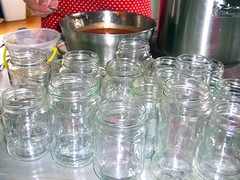 |
| Flickr photo by spin spin |
But first, a bit of a reality check: You're more likely to be struck by lightning than to strike it rich as a sauce mogul. In fact, most brand-new specialty-foods (including sauces) manufacturers get out of the business--voluntarily or involuntarily--within in two to three years of starting their business. Don't believe me? Just read "So You Want to be a Sauce Mogul" and the two later posts under the "sauce mogul" label to get a feel for what a new sauce maker is up against. No, we're not trying to discourage anyone but rather to encourage you to keep expectations reasonable and to understand the challenges that will lie ahead.
If you're still reading, and still interested in making your dream of bottling and selling your own sauce a reality, here are some places where you'll find boatloads of practical, useful information.
 First, NC State University's Entrepreneur Initiative for Food website discusses a variety of essential topics including the nuts and bolts of how to start your food business, nutritional testing and labeling of products, state and federal resources, workshops and events. Even if you're in another state, it's worth reading through these materials and then checking with your local state university or community college to see if they offer similar resources and programs near you.
First, NC State University's Entrepreneur Initiative for Food website discusses a variety of essential topics including the nuts and bolts of how to start your food business, nutritional testing and labeling of products, state and federal resources, workshops and events. Even if you're in another state, it's worth reading through these materials and then checking with your local state university or community college to see if they offer similar resources and programs near you.Likewise, the NC Department of Agriculture's food business page covers the laws and regulations that may apply to your business, and provides links to additional government and private resources. If you are not based in NC, simply check with your own state's agriculture department to see what they offer. And don't forget your local cooperative extension office, too.
While some first-time specialty-foods manufacturers insist on handling the actual production and bottling themselves, it can be cumbersome and/or impractical to get your home kitchen inspected and properly certified (permitted) for commercial production, especially if you have small children or pets. Unless you have access to a restaurant kitchen or shared-use community kitchen (usually rented by the hour) and already know how to safely process your recipe so that the product is shelf-stable (won't spoil or get anyone sick), your best bet is to find a local contract bottler, i.e., a "co-packer." Many small manufacturers here in NC use Bobbees Bottling in Lousiburg, NC as their copacker. If you're not in NC, it's still worth looking through their website to give you an idea of what to expect from copackers in your area.
In terms of shared-use or community kitchens that you can rent by the hour or the day (you bring your own ingredients & packaging), the premier facility in NC is Blue Ridge Food Ventures, located just outside of Asheville. In the Piedmont or central NC region, there's the Piedmont Food & Ag Processing Center in Hillsborough and The Cookery in Durham. And just outside Wilmington in the eastern part of NC you'll find Eastern Carolina Food Ventures, which is part of James Sprunt Community College. There are several other similar facilities in North Carolina, and I bet your state will have some, too. Just do an internet search for "shared-use kitchen" or "incubator kitchen" and the name of your state.
 |
| Buy Jump Up & Kiss Me Hot Sauce |
I hope the information here helps you on your journey towards becoming a sauce entrepreneur. Please feel free to share this post with anyone who might find it useful, and leave a comment with any questions or to share your own personal experience as a specialty-foods small business.
Zestfully yours,
Gloria


























No comments:
Post a Comment